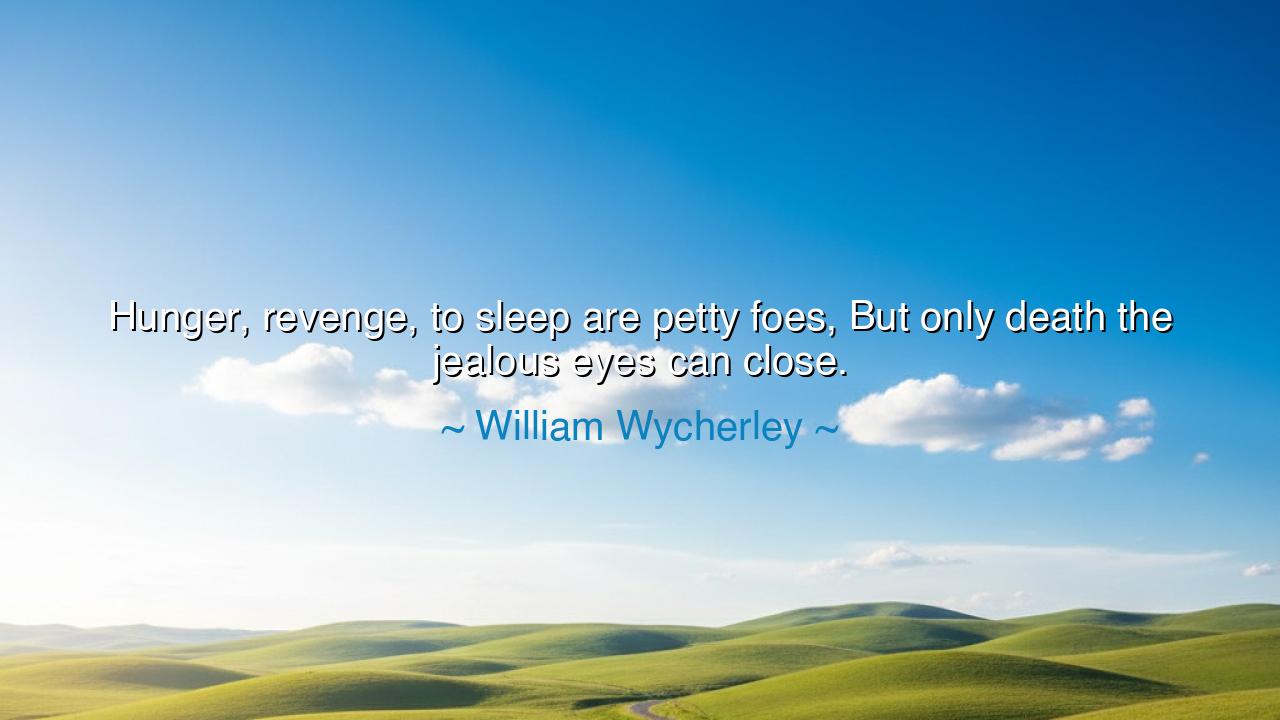
Hunger, revenge, to sleep are petty foes, But only death the






The words of William Wycherley, “Hunger, revenge, to sleep are petty foes, but only death the jealous eyes can close,” descend upon the soul like the whisper of a truth long known but seldom spoken aloud. In this reflection, Wycherley—playwright of wit and insight—turns his gaze from the intrigues of men to the deeper currents of the human heart. He names jealousy not as a fleeting emotion, but as a relentless tormentor, one whose fire consumes reason, peace, and even rest. Hunger can be fed, revenge can be taken, and sleep may soothe other pains—but jealousy, he tells us, yields to no mortal remedy. Only death can still its restless eyes.
William Wycherley, a dramatist of seventeenth-century England, lived in an age of brilliance and corruption, of beauty masked by vanity and vice. His plays, such as The Country Wife and The Plain Dealer, exposed the hypocrisies of society with sharp humor. Yet beneath the laughter, Wycherley understood the darker truths of human nature. His words on jealousy rise not from cynicism, but from observation. In the glittering world of love and ambition he inhabited, he saw how jealousy haunted both the noble and the lowly. It gnawed at lovers, poisoned friendships, and even corroded the joy of success. To him, jealousy was not merely an emotion—it was a shadow that clung to the soul until the grave.
When Wycherley writes that hunger, revenge, and sleep are "petty foes," he does not belittle human struggle; rather, he places it in perspective. Hunger is physical and can be sated with bread. Revenge, though fierce, ends once vengeance is taken. Sleeplessness is conquered when the mind finds rest. These are adversaries of the body and the moment, transient and conquerable. But jealousy, he warns, is a foe of the spirit—subtle, unyielding, and eternal. It does not die with satisfaction, for it feeds on comparison and desire. It is the enemy that looks through the eyes and sees not beauty, but loss; not love, but threat; not abundance, but scarcity.
History offers countless examples of this torment. Consider the tragedy of Othello, the noble Moor of Shakespeare’s stage, whose jealous heart was turned against the very woman he adored. No sword, no sleep, no counsel could free him from the serpent that whispered within. Only death—his own and Desdemona’s—could silence the storm. And so it is in life: jealousy blinds even the wise, poisons even the pure. It is the fire that devours both victim and vessel, leaving nothing but ashes of what might have been.
Yet, Wycherley’s insight does not merely condemn—he also reveals. In recognizing that death alone can close the jealous eyes, he points us toward the remedy of wisdom: that only by transcending the self can jealousy be defeated. For what is jealousy but the fear of being less, the belief that love and worth are finite? The soul that understands its own wholeness no longer envies; it beholds others with compassion, not competition. Death, in its symbolic sense, need not mean the end of life, but the death of ego—the stilling of that inner voice that says, “I am not enough.” When that false self perishes, peace begins.
There is a paradox here: death, feared by all, is revealed as the great liberator. It ends the tyrannies that life cannot tame—the pangs of hunger, the ache of revenge, and the fever of jealousy. But the wise need not wait for the grave to know such peace. They can die to envy while living. They can let gratitude replace comparison, humility replace pride, and trust replace suspicion. Then, even while breathing, their eyes are no longer jealous, but serene.
The lesson, therefore, is profound and enduring: guard your heart against jealousy, for it is the most cunning of foes. When you feel its chill, do not feed it with thoughts of what others have—feed your soul with remembrance of what is yours. Seek joy not in possessing, but in appreciating; not in outshining, but in understanding. Practice the art of letting go, for peace is born only in release.
So remember, O seeker of wisdom: jealousy is a hunger without end, a fever without cure. To master it is to be free. Let the jealous eyes close—not by death of the body, but by awakening of the spirit. And then, when the time of true twilight comes, you shall not meet death as a foe, but as a friend, for you will have already known what it means to rest in the stillness beyond envy, beyond desire, beyond all fear.






AAdministratorAdministrator
Welcome, honored guests. Please leave a comment, we will respond soon